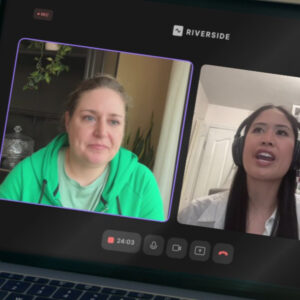Keywords: Long COVID, BIPOC, healthcare, primary care, symptoms, Angela Rudolph, COVID experience, chronic illness, patient advocacy, health disparities, Long COVID, healthcare disparities, disability, personal journey, community support, chronic illness, advocacy, mental health, systemic barriers, identity
Summary: In this episode of Long COVID Real Talk, host Katherine Marie speaks with Angela Rudolph about her personal journey with Long COVID. Angela shares her experiences as an essential worker during the pandemic, the challenges she faced after contracting COVID, and her struggles with the healthcare system. She emphasizes the importance of finding a supportive primary care doctor and the unique challenges faced by BIPOC individuals in healthcare. Angela’s story highlights the need for better understanding and support for those suffering from Long COVID. In this conversation, Angela Rudolph shares her personal journey with long COVID, highlighting the systemic challenges within the healthcare system, the emotional and physical struggles she faced, and the importance of community support. She discusses the disparities in long COVID awareness, particularly among people of color, and emphasizes the need for better advocacy and understanding of chronic illnesses. Angela also reflects on her identity as a disabled person and offers practical tips for navigating life with long COVID, including the significance of pacing and listening to one’s body.
Takeaways:
- Angela was a career-focused individual before COVID.
- She worked as an essential worker during the pandemic.
- Angela contracted COVID at a women’s empowerment retreat.
- She experienced severe symptoms of Long COVID.
- Navigating the healthcare system was challenging for her.
- Angela felt the need to advocate for herself in healthcare.
- She sought a primary care doctor of color for better outcomes.
- It took over a year to find a supportive primary care doctor.
- Angela’s experience reflects broader health disparities.
- Community support was crucial in her journey. The healthcare system often overwhelms doctors, impacting patient care.
- Chronic illness patients face systemic barriers in receiving adequate care.
- Angela experienced cognitive challenges due to COVID, affecting her communication.
- Rehabilitation helped Angela regain her mobility and cognitive function.
- Embracing disability is a crucial part of Angela’s healing process.
- There is a significant lack of representation in long COVID research for people of color.
- Disability can occur unexpectedly, affecting anyone at any time.
- Community support is vital for those navigating long COVID.
- Pacing oneself is essential to avoid post-exertional malaise.
- Listening to one’s body is the best guide for managing health.
Don’t forget to subscribe, share, and leave a 5 star review if you liked today’s episode! Thank you so much for listening! 🌟🌟🌟🌟🌟
Listen to our podcast here: http://www.longcovidrealtalk.com
or here: https://open.spotify.com/show/5GXxBfoO9JImpjYKegNfdS
If you would like to tell your story on the podcast or have any questions or comments — or just want to say hey!
You can:
Email: [email protected]
Google Voice/Text: 1-650-382-2217
YouTube: @LongCOVIDRealTalkPodcast
Facebook Group: https://www.facebook.com/groups/418306020831350
Instagram: longcovid.realtalk
Threads: longcovid.realtalk
Twitter: @LCRealTalk
Tik Tok: @katherinemarie974
Pinterest: @longcovidrealtalk
Bluesky: @longcovidrealtalk.bsky.social
Snapchat: @lcrealtalk
Discord: katherinemarielongcovidrealtalk
Discord group: https://discord.gg/aNbKfPHf
DISCLAIMER: Information provided by Long COVID Real Talk Podcast is for general informational purposes only. The medical/health information is provided for general informational and educational purposes only and is not a substitute for professional advice. Always consult with your designated medical professional.


